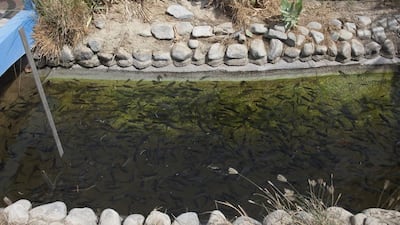A fish-breeding project aimed at clearing mosquito larvae that breed in irrigation basins and pools in Dubai should save the emirate Dh3.5 million.
Dubai Municipality introduced the project in August to move away from using pesticides to kill the larvae because of the harm to the environment and public health.
“There are areas where stagnant water collects because of the flow of groundwater, rain, artificial lakes, irrigation tanks and water leaks from sewage, which lead to mosquito breeding,” said Hisham Yahya, the municipality’s head of pest control.
“The department used to spray these areas with insecticide continuously to control mosquito breeding but it entails costs and a negative impact on groundwater and soil as it contains chemicals that mix with the soil, seep into the groundwater and cause pollution.”
Mr Yahya said other harmful effects included groundwater contamination.
“It also causes poisoning from close contact with pesticides that enter the body through the skin, mouth or breathing,” he said.
A large number of Arabian killifish (aphanius dispar), the locally farmed fish that eat mosquito larvae, was distributed in about 1,400 irrigation basins on farms and about 300 watersheds in Dubai.
“It’s certainly a good way to control malaria in certain places and it’s a principle that dates back hundreds of years,” said Dr Jean-Yves Mevel, an aquaculture professor at UAE University.
“There are some places in the UAE with stagnant water where mosquitoes breed well and, if there is not enough fish to eat the larvae that can be a problem, so this is a good way of dealing with it.”
Dr Mevel said small fish generically called mosquitofish also ate mosquito larvae and were bred in many places.
“Even the tilapia fish will eat larvae,” he said. “But the main thing isn’t about only putting fish in the pond, you have to provide access to the pond.”
Dr Mevel said if the pond were full of algae and plants, then the fish would not be able to access the mosquitoes.
“So you have to control the vegetation too to access every corner of the pond. Otherwise, it’s not that efficient.”
Zuhoor Al Sabbagh, the municipality’s director of public health services, said there was a plan to breed other types of fish for pest control and produce large numbers to cover all basins on farms and water pools in Dubai.
“The total cost of the project is Dh102,000, which helps to rationalise approximately Dh3.5 million,” Ms Al Sabbagh said.
“The proposal also contributes to develop green projects, reduced the contamination of soil and groundwater and controls the prevalence of diseases and epidemics due to the proliferation of mosquitoes.”
cmalek@thenational.ae

